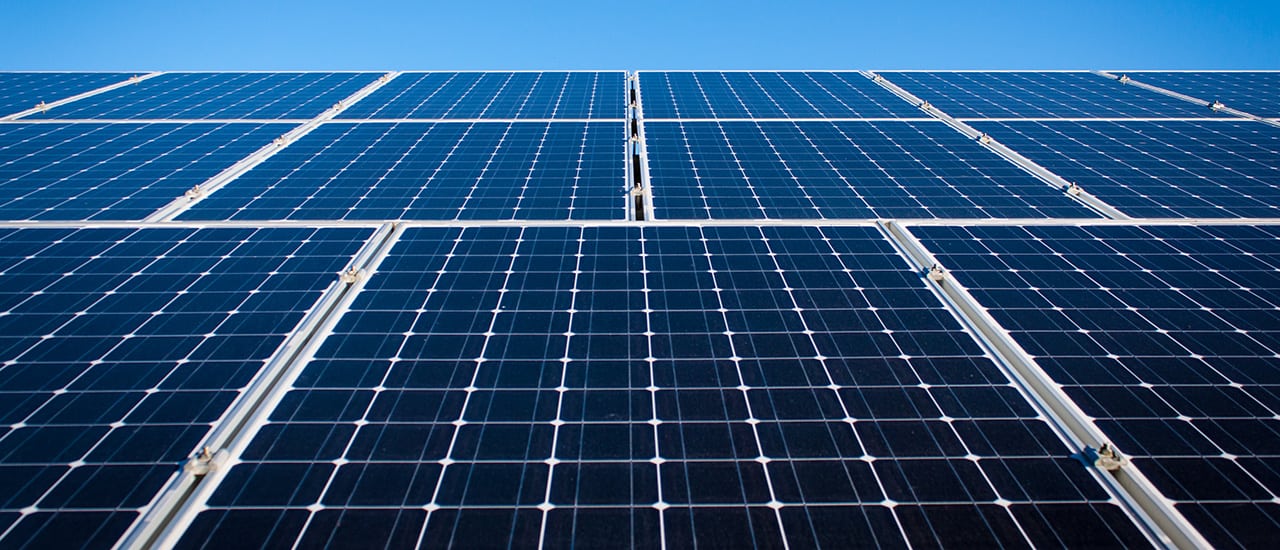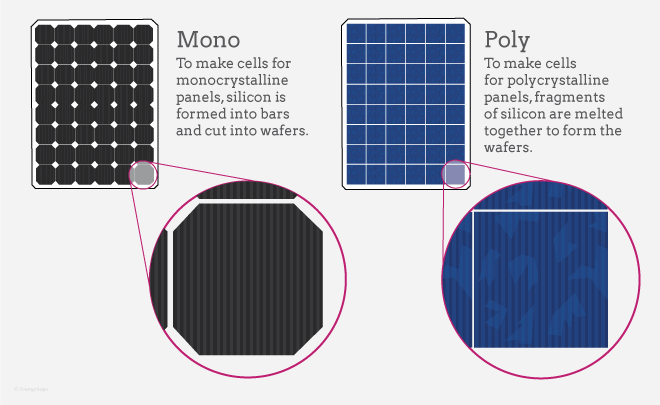Solar Panels capture energy from the sun and turns it into electrical energy. Almost all of today’s Photovoltaics are made of Silicon which is one of the most abundant and durable element available to us.
There are two main categories of Solar Panels, namely Monocrystalline and Polycrystalline. The main difference between these two types of Solar Panel is the puty of the silicon. Simply put, the purer the silicon, the more perfectly aligned are the silicon molecules and the more efficient the solar panel is at converting solar energy into electricity.


MONOCRYSTALLINE SILICON SOLAR CELLS
Solar cells made of monocrystalline silicon (mono-Si), also called single-crystalline silicon (single-crystal-Si), are quite easily recognizable by an external even coloring and uniform look. An easy way to differentiate a mono and poly crystalline solar panel is by looking at the edges of the solar cell. Monocrystalline solar cells have rounded or beveled edges whereas Polycrystalline solar cells look perfectly rectangular.
To make solar cells for monocrystalline solar panels, silicon is formed into bars and cut into wafers. These types of panels are called “monocrystalline” to indicate that the silicon used is single-crystal silicon. Because the cell is composed of a single crystal, the electrons that generate a flow of electricity have more room to move. As a result, monocrystalline panels are more efficient than their polycrystalline counterparts.
POLYCRYSTALLINE SILICON SOLAR CELLS
To make polycrystalline solar panels, raw silicon fragments are melted and poured into square molds which are then cooled and cut into perfectly square wafers. Polycrystalline solar panels are also referred to as “multi-crystalline,” or many-crystal silicon. Because there are many crystals in each cell, there is to less freedom for the electrons to move. As a result, polycrystalline solar panels have lower efficiency ratings than monocrystalline panels.
MONO VS POLY CRYSTALLINE SILICON SOLAR CELLS
| Monocrystalline | Polycrystalline | |
|---|---|---|
| Cost | More expensive | Less expensive |
| Efficiency | More efficient (15-20%) | Less efficient (13-16%) |
| Aesthetics | Solar cells are a black hue | Solar cells have a blue-ish hue |
| Performance | Better performance under low-light conditions | Less performance under low-light conditions |
| Longevity | 25+ years | 25+ years |
AVAILABLE SOLAR PANELS
Polycrystalline Solar Panels
- SM10P-12 – Polycrystalline Solar Panel (12V, 10W)
- SM20P-12 – Polycrystalline Solar Panel (12V, 20W)
- SM40P-12 – Polycrystalline Solar Panel (12V, 40W)
- SM50P-12 – Polycrystalline Solar Panel (12V, 50W)
- SM60P-12 – Polycrystalline Solar Panel (12V, 60W)
- SM60P-24 – Polycrystalline Solar Panel (24V, 60W)
- SM75P-12 – Polycrystalline Solar Panel (12V, 75W)
- SM100P-12 – Polycrystalline Solar Panel (12V, 100W)
- SM150P-12 – Polycrystalline Solar Panel (12V, 150W)
- SM160P-12 – Polycrystalline Solar Panel (12V, 160W)
- SM200P-12 – Polycrystalline Solar Panel (12V, 200W)
- SM260P-24 – Polycrystalline Solar Panel (24V, 260W)
Monocrystalline Solar Panels
- SM60M-12 – Monocrystalline Solar Panel (12V, 60W)
- SM100M-12 – Monocrystalline Solar Panel (12V, 100W)
- SM160M-12 – Monocrystalline Solar Panel (12V, 160W)
- SM200M-24 – Monocrystalline Solar Panel (24V, 200W)
- SM260M-24 – Monocrystalline Solar Panel (24V, 260W)

